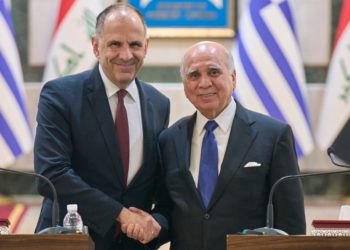On Sunday, Argentine President Javier Milei’s far-right political movement achieved a strong showing in the country’s midterm elections. His La Libertad Avanza (LLA) party secured nearly 41 percent of the national vote, a plurality. Roughly half of the lower house and one-third of the Senate were up for grabs. The LLA gained seats in both chambers, increasing its share of deputies from 37 to 101 and senators from six to 20.
The LLA still lacks a congressional majority. But its increased influence will boost Milei’s libertarian agenda and pro-market reforms, which have involved drastic public spending cuts and sowed division across Argentine society since he took office nearly two years ago.
While Milei’s signature austerity measures have succeeded in lowering the country’s runaway inflation—the annual inflation rate dipped to 31.8 percent last month, down from more than 200 percent a year prior—they have also gutted social services, alienating many of the working and middle-class voters who helped propel Milei’s outsider candidacy to power. Real incomes have declined, poverty has deepened (although that trend may be stalling), and inequality has widened as the costs of economic stabilization become more apparent.
Until last weekend, Argentines’ patience for Milei’s self-proclaimed “anarcho-capitalist” eccentricities seemed to be wearing thin. The president’s approval rating reached a record low of 32 percent in September, a month that also saw voters in Buenos Aires province hand the LLA a hefty 13-point defeat in local elections. Corruption scandals involving the party’s leaders and a sharp slide in the peso—down more than 24 percent this year against the dollar—further contributed to pessimism about Milei’s prospects.
Recent polling suggested that this opposition wave would continue in the midterms—so much so that Milei’s government set its own target vote share at a modest 30 percent to 35 percent. Now, with the final votes counted, Milei has found his expectations exceeded and his mandate renewed.
There are several possible explanations for Argentina’s midterm upset. Milei’s success in cutting inflation, opposition fragmentation, and voters’ fears of further economic instability all likely contributed. Historically low voter turnout of 68 percent—notable in a country with mandatory voting—may have also played a part.
But among these factors, it is the Trump administration’s headline-grabbing $40 billion bailout package for Argentina—a gift that Milei hailed as “something unprecedented, not only in Argentine history but in world history” in his victory speech on Sunday—that will have the broadest implications for the future of global democracy and U.S. foreign interventionism.
When U.S. President Donald Trump and U.S. Treasury Secretary Scott Bessent first unveiled the bailout plans in late September, they named several reasons for their uncharacteristic embrace of foreign assistance, particularly after gutting so much of the U.S. aid sector. Bessent wrote on X that a currency swap would “provide stability” to Argentina’s economy and help “anchor a prosperous Western Hemisphere.”
Elsewhere, Bessent justified the government’s strategy by suggesting that it would bring Argentina into Washington’s sphere of influence under an “economic Monroe Doctrine” and boost ideological allies elsewhere in the region—such as in Chile, which holds presidential elections next month.
At a White House meeting with Milei two weeks later, Trump provided the exact terms of the bailout, announcing that U.S. support would depend on Milei prevailing in the midterms. In doing so, the United States laid bare the aims of its generosity: By dangling a financial lifeline in front of Argentine voters, Trump hoped to create an incentive for them to back his favored candidate.
What made this moment extraordinary was its bluntly partisan character; Trump celebrated the maneuver not as a matter of regional stability or U.S. national interest, but in the campaign-style language that a U.S. president would normally use when commenting on the victory of a domestic political ally.
After Milei’s Oct. 26 victory, Trump quickly claimed credit: “He had a lot of help from us,” Trump said. “He had a lot of help. I gave him an endorsement, a very strong endorsement.”
Partisan interventionism is a novel through line of Trump’s second-term foreign policy. In elections, trials, and other democratic processes around the world, Trump has used the imprimatur of the U.S. presidency—and, occasionally, the full power of the U.S. government—to support the interests of his right-wing partisans at the expense of diplomatic norms and democratic principles.
While past U.S. presidents have often backed leaders and candidates abroad—including some with authoritarian ambitions, as during the Cold War—none have done so with interests as narrow as Trump’s. In his interventionism, the president sees no higher principle or grand strategy—only friends to be supported and enemies to be weakened.
The Trump administration has so far pursued many different kinds of partisan intervention. To support his ideological allies, Trump has used tariffs and sanctions; overt endorsements and condemnations; and now, conditional economic aid. Before Argentina, U.S. officials had backed candidates in close elections in Romania and Poland; weighed in on domestic judicial processes in Israel, Colombia, and Brazil; and denounced the enforcement of electoral regulations in France and Germany. Elsewhere, in El Salvador and Serbia, Trump and his vassals have even targeted civil society movements dedicated to challenging allied leaders’ abuses of power.
In Latin America, the logic of partisan U.S. interventionism has played out unevenly. In Brazil, for instance, Trump has relied primarily on punitive measures—tariffs on steel and soybeans, visa cancellations for senior officials, and rhetorical attacks against President Luiz Inácio Lula da Silva—to signal disapproval of a left-leaning government that Trump regarded as hostile until last month’s unexpected thaw in U.S.-Brazil relations.
Far from weakening Lula, however, these stick-based interventions produced a rally-round-the-flag effect. Lula’s approval ratings, which had trended downward before the bilateral crisis, climbed to an annual high in the weeks following Trump’s tariff announcement; even centrist and conservative Brazilians bristled at the United States’ assault on their national sovereignty.
In the case of Argentina, Trump wielded financial largesse to shore up an ally rather than undermine an adversary. He has also used this carrot-forward approach in El Salvador. The Trump administration has expanded its relationship with autocratic Salvadoran President Nayib Bukele in exchange for El Salvador’s detention of migrants deported from the United States. Trump hosted Bukele at the White House in April and has praised his “tough-on-crime” model as a blueprint for Latin America.
Yet even intervention with economic incentives has generated unease among Milei’s critics. In Argentina, social media outrage under the hashtag #PatriaOColonia (“Motherland or Colony”) captured a perception among part of the electorate that Trump’s support came at the cost of national dignity. Jorge Taiana, a former defense minister and leading Peronist opposition candidate in the province of Buenos Aires, demanded on X that Trump “stop extorting the Argentine people!”
In the United States, the political dividends of such interventions have been limited. U.S. farmers have criticized the Argentina bailout as a betrayal of Trump’s “America First” agenda, arguing that subsidizing a foreign beef and soybean exporter undercuts American producers. Members of Congress from both parties have questioned the legality of tying financial assistance to a foreign electoral outcome. Even some “Make America Great Again” stalwarts have voiced their concerns: On Oct. 23, Republican Rep. Marjorie Taylor Greene decried the aid package as “one of the grossest things” that she’s “ever seen” and a “punch in the gut to all of our American cattle ranchers.”
Trump’s lavish economic overtures may incentivize right-wing contenders across the region to seek his favor through symbolic displays of loyalty. In Peru, Lima Mayor Rafael López Aliaga, who plans to run for president next year, recently staged a city-funded memorial service for Trump ally and right-wing activist Charlie Kirk, who was assassinated in September. The event involved bussing in attendees from poor neighborhoods, many of whom had reportedly never heard of Kirk.
But beyond its troubling normative implications, partisan interventionism also carries a clear strategic risk for the United States. By anchoring bilateral relations in ideological alignment, Washington is turning diplomacy into a volatile enterprise that is subject to electoral trends abroad.
In much of Latin America, anti-incumbent sentiment runs deep, governing coalitions rarely last long, and opposition victories are the norm rather than the exception. When U.S. engagement is so openly partisan, each political transition risks reversing progress made with previous administrations. The result is a diplomacy of oscillation: generous bailouts and warm rhetoric for ideological allies, followed by sanctions, tariffs, or neglect for newly empowered adversaries.
This cycle not only undermines Washington’s credibility as a stable partner but also complicates cooperation on shared priorities—such as migration, energy, climate, or organized crime—that demand consistency across administrations.
Beijing’s steadier diplomatic approach underscores the long-term disadvantages of Trump’s model. While China certainly has preferences when Latin American voters head to the ballot box, it has avoided public meddling in regional elections, preferring to cultivate relationships with whomever holds power. Trade between China and Brazil, for instance, expanded even during the tenure of former Brazilian President Jair Bolsonaro, a Trump ally who had campaigned on cutting ties with “communist regimes” and even traveled to Taiwan before his 2018 election.
While Trump may occasionally succeed in swaying short-term political outcomes, his transactional, personality-driven strategy erodes the foundations of lasting U.S. influence. Countries accustomed to pragmatic and nonideological engagement from Beijing may come to view Washington as an unreliable partner—one whose friendship depends less on shared interests than on ideological fealty.
The post Milei’s Midterm Miracle appeared first on Foreign Policy.




